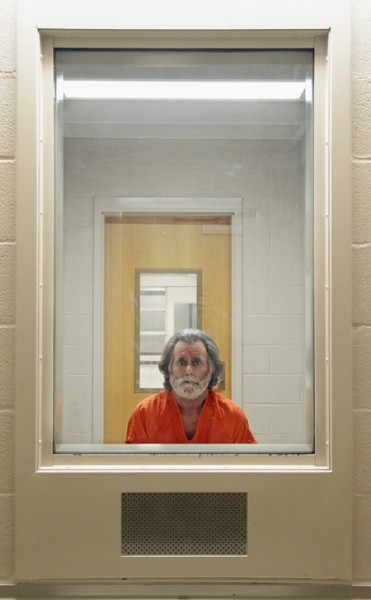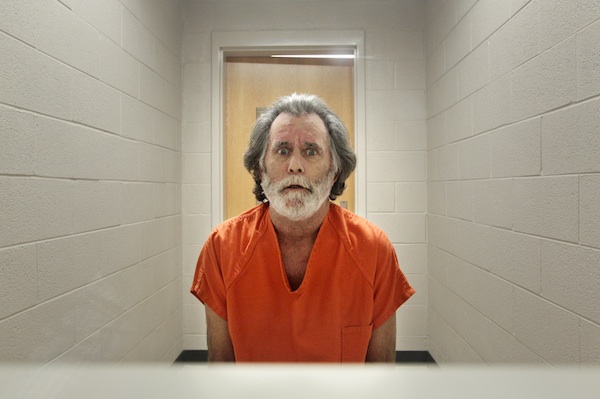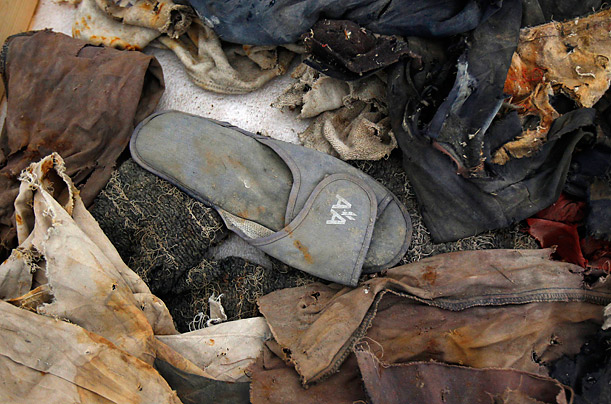Notes
Catch-22 2011: Robbed Bank to Get Medical Care in Jail
James Richard Verone peers through the glass of a visitation booth at the Gaston County Jail on Thursday June 16, 2011, where he is being held while awaiting trial for an alleged bank robbery. (Ben Goff / The Gazette)
There has been a portrait of an incarcerated man with wide eyes circulating the news this past week (above). Photographer Ben Goff (Flickr here) released of one other image (below) from his assignment photographing James Richard Verone in Gaston County Jail, N.C.
Verone, as Zachary Roth succinctly puts it, “robbed bank to get medical care in jail.” This is a man on the very brink. Or is he? Verone made a very drastic, but reasoned, decision to carry out a non-violent act outside the law. It’s an extreme protest admittedly, but he’s carrying all the risk. So cut him some slack.
Given that he thought through his bank robbing etiquette, waited patiently for the police and explained his motives to the press, don’t you think this man has a complex understanding of consequence? Could this be a photo of a man who knows how image and media work? Admittedly, there is potential that viewers will presume Verone’s mental health – as well as his physical health – is suspect. But could Verone be performing for the camera? I’d like to suggest Verone is in an interaction with one of the few people (Goff) who is in the business of creating testimony to stories so that they may be publicly consumed. As such, Verone consciously provides the exact facial expression he thinks we need to see.

James Richard Verone peers through the glass of a visitation booth at the Gaston County Jail on Thursday June 16, 2011, where he is being held while awaiting trial for an alleged bank robbery. (Ben Goff / The Gazette)
Verone is not pushing a political agenda; he’s trying to save his own life. He is just asking for us to see his truth. If we were in Verone’s circumstances we’d probably be severely unsettled (or, in the vernacular) crazy.
But here’s the paradox of the image: it is easier and lazier to think of Verone, even in a very small way, as crazy than it is to think of him as a rational being; to do so, would push us to ask why a rational person is behind bars. Wouldn’t logic dictate that the medical, societal and legal systems that conspired to put a rational man in jail are in fact themselves illogical?
Verone is a logic-evangelist and we need to see the light.
Within the fabric of our society, there exists a vast gulf between the ways people interface with services and institutions. To me, that is crazy.
I’m partly, suggesting a false dilemma here. There are, of course, more than two alternatives in how we see/react to the portrait. And yet, the glass of the visiting booth provides an excuse for our distance; an us and them; 1s and 0s; have and have-nots; not crazy and crazy.
Goff captions his two images Crazy Eyes and Crazy Eyes 2. Denigratory, clumsy and observant all in one, Goff describes the first startle (the first impression, if you like) Verone gives to his audience. But the introduction is only one part of this cruel photo that brims with abundance.
FREE
When I used the phrase “Verone gives to his audience” it was deliberate. That reaction is yours. Take it for free. That reaction is the opening gambit of an interaction between you, Verone and your conscience.
We believe that physical freedom ensures also the freedoms to worship, speech, choice, vote and so on and so forth. But in terms of providing immediate critical health-care, none of those things have provided for Verone. In “free society”, Verone was in economic shackles.
TRUST US
Verone’s dire straits have not been helped by America’s recession. How does Verone’s non-existent $1 bank robbery compare to the Inside Job in 2008 on Wall Street? What do we want to focus on? The pseudo-crime of an individual or the corruption of the finance sector? Michael Capuano, a Democratic representative for Massachusetts, once rebuked a panel of banking executives. He said, “You come to us today telling us we’re sorry, we won’t do it again; trust us. Well, I have some people in my constituency that actually robbed some of your banks, and they say the same thing”.
“Trust Us.” I’m sure Verone has said it to explain his truth, and I’m sure we’d say it too. “Trust us, trust me, I’m not crazy.”
LISTEN TO US
Verone’s story will resurface in the presidential debates I’m sure. It provides cheap political ammo for all parties depending on how it is spun. Verone’s face is read as either the failure of Democrat-led health reform or as the result of Republican-led economic meltdown. In either case, Verone plays both tragic hero and bogey man. Of which, he is neither.
CARE FOR US
The worst thing we could do would be to presume Verone has achieved, or will achieve, his objective. California demonstrated lethally how facilities of incarceration can fail to provide healthcare that meet minimum constitutional standards.
REMEMBER US
On the 1st of this month, an Ohio inmate who was denied medical care committed suicide. The prisoner, Greg Stamper hanged himself at Ohio’s Allen Correctional Institution. The press release from the Ohio Justice and Policy Center reads:
[Stamper] was suffering excruciating pain as a result of a nerve condition, and Dr. Myron Shank had refused to give him pain medications multiple times for non-medical reasons.
Stamper has his own truth and logic too. There’s likely two reasons his suicide was not widely circulated in the media. 1) It’s too final and upsetting. 2) Unlike Verone’s story, Stamper’s story is typical for the prison industry.
— Pete Brook
(cross-posted from Prison Photography inspired by a post at Reciprocity Failure.)



Reactions
Comments Powered by Disqus